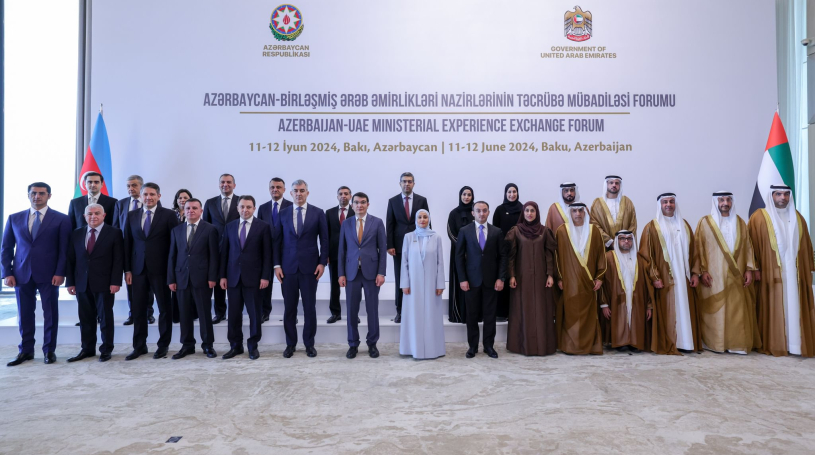UAE, Azerbaijan explore partnerships at Ministerial Experience Exchange Forum
BAKU, 13th June, 2024 (WAM) -- The governments of the United Arab Emirates and the Republic of Azerbaijan have concluded the Ministerial Experience Exchange Forum, where representatives explored strategic partnerships to foster the exchange of government experiences.
The two-day event took place in Baku and was attended by ministers and senior officials from both governments, with leaders participating in a series of ministerial dialogues as part of a program of more than 20 sessions and meetings. The forum aimed to promote bilateral cooperation and communication between government leaders as well as encourage the exchange of experiences and success stories from each government.
The UAE’s delegation included Ohood bint Khalfan Al Roumi, Minister of State for Government Development and The Future, Hessa bint Essa Buhumaid, Director-General of Community Development Authority in the Government of Dubai (CDA), Younis Haji Al Khouri, Under Secretary of the Ministry of Finance (MoF), Abdulla Lootah, Deputy Minister of Cabinet Affairs for Competitiveness and Experience Exchange, Abdulla Al Saleh, Under-Secretary of the Ministry of Economy (MoE), Mohammed Abdul Rahman Al Hawi, Under-Secretary of the Ministry of Investment (MoI), Sharif Salim Al Olama, Under-Secretary for Energy and Petroleum Affairs in the Ministry of Energy and Infrastructure, Mohamed Al Qassim, Director-General of Emirates Schools Establishment, and Laila Obaid Al Suwaidi, Director-General of the Federal Authority for Government Human Resources (FAHR).
Mohamed Bin Taliah, Chief of Government Services of the UAE Government, Hanan Ahli, Managing Director of the Federal Competitiveness and Statistics Centre (FCSC), Dr. Amer Sharif Chief Executive Officer of Dubai Health and President of the Mohammed bin Rashid University of Medicine and Health Sciences (MBRU), Prof. Dr. Alawi Asheikh-Ali Deputy Chief Executive Officer and Chief Academic Officer, Dubai Health. Provost, Mohammed bin Rashid University of Medicine and Health Sciences (MBRU), and Hamdah Bin Kalban, Director of Governance at the General Secretariat of the Executive Council of Dubai also joined the UAE delegation.
Azerbaijan’s representatives included Ulvi Mehdiyev, Chairman of the State Agency for Public Service and Social Innovations under the President of the Republic of Azerbaijan, Vusal Huseynov, Chief of State Migration Service, Elnur Aliyev, First Deputy Minister of Economy, Umayra Taghiyeva, Deputy Minister of Ecology and Natural Resources, Hasan Hasanli, Deputy Minister of Science and Education, Nadir Zeynalov, Deputy Minister of Health, Anar Karimov, Deputy Minister of Labor and Social Protection of the Population, Bahram Khalilov, Deputy Chairperson of the Board of Directors of the State Examination Center (SEC), and Jeyhun Salmanov, Deputy Chairman at the State Agency for Public Service and Social Innovations.
In her opening remarks, Al Roumi highlighted that the relations between the UAE and Azerbaijan are strong and solid, pointing to a recent visit by President His Highness Sheikh Mohamed bin Zayed Al Nahyan, to Azerbaijan in January 2024, where several agreements were signed and activated.
"In line with the UAE leadership’s vision, the government has made shaping the future a strategic priority. Today's rapid global changes have made it clear that emerging trends have a critical role in shaping our future. The world is entering a new era defined by new trends, such as digitalisation, technological advancement, smart public services and government accelerators, and sustainability,” she added.
For his part, Mehdiyev pointed out that the relations between Azerbaijan and the UAE are on an upward trajectory. “Economic cooperation between Azerbaijan and the UAE has reached new horizons, especially in the field of green energy. Our partnership represents a forward-looking, proactive approach to development in various areas of common interest,” he said.
Hessa Buhumaid highlighted the key objectives of the Dubai Social Agenda 33; the government’s comprehensive plan for its community, saying, “Traditional social services are unsustainable in this rapidly evolving world. In the UAE, our approach focuses on strengthening social cohesion and bolstering the economy through strategic investment.”
Lootah emphasised the importance of promoting friendly relations between the two countries, touching on the Year of Sustainability announced by President His Highness Sheikh Mohamed bin Zayed Al Nahyan in 2023 and extending into 2024. This initiative raised awareness of the need for sustainability and defined some of its key principles in support of the Sustainable Development Goal (SDG) 17, on revitalising global partnerships for sustainable development. He also discussed the significant role of the Ministerial Experience Exchange Forum in supporting sustainable development by sharing the UAE's expertise in creating a future-ready government model.
The forum covered key topics including economic diversification and investment, ecology and green energy in relation to the pursuit of low-carbon economies, education, health, social wellbeing, public service and innovation, regulatory frameworks, and creating a business-friendly environment in both Azerbaijan and the UAE. Discussions touched on the UAE’s successful hosting of COP28 and Azerbaijan’s preparations to host COP29 later this year. Delegates discussed the development of the education systems, stressing the importance of future skills and international cooperation. They also explored trends in the health sector, with a focus on improving infrastructure, accessibility, and promoting quality through technology. Finally, the forum addressed questions around social care and wellbeing, before exploring smart public services and cooperation between the two countries in this field.
In November 2022, the UAE and Azerbaijan launched a strategic partnership to promote the exchange of government expertise across seven pillars, including government excellence, government services, capacity building, competitiveness and statistics, policies and strategies, government accelerators, and government performance.



